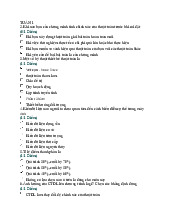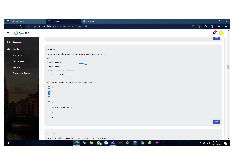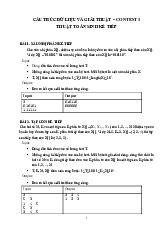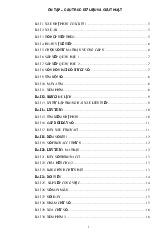



















Preview text:
C Programming Basic Basis - part 1 Introduction
• C Programming practice in UNIX environment.
• Programming topics related to [Data Structures and Algorithms] • Compiler: gcc
• Editor: Emacs, K-Developper,.. gcc syntax • Parameter: -Wall : turn on all alerts -c: make object file -o: name of output file -g: debug information -l: library
gcc –Wall hello.c –o runhello ./runhello Content • Topic:
• Array, String, Pointer Review
• Character based File operations in UNIX • Programming Exercises Array
• A block of many variables of the same type
• Array can be declared for any type
• E.g. int A[10] is an array of 10 integers. • Examples: • list of students’ marks
• series of numbers entered by user • vectors • matrices Arrays in Memory •
Sequence of variables of specified type •
The array variable itself holds the address in memory of beginning of sequence • Example: … 0 1 2 3 4 5 6 7 8 9 … double S[10]; S •
The k-th element of array A is specified by A[k-1] (0-based) Example - reverse #include int main(void){ int i, A[10];
printf("please enter 10 numbers:\n"); for(i=0; i<10; i++) scanf("%d", &A[i]);
printf("numbers in reversed order:\n"); for(i=9; i>=0; i--) printf("%d\n", A[i]); return 0; } Exercise
• Write a program that gets an input line from the user (ends with
‘\n’) and displays the number of times each letter appears in it.
The output for the input line: “hello, world!”
The letter 'd' appears 1 time(s).
The letter 'e' appears 1 time(s).
The letter 'h' appears 1 time(s).
The letter 'l' appears 3 time(s).
The letter 'o' appears 2 time(s).
The letter 'r' appears 1 time(s).
The letter 'w' appears 1 time(s).
Assume all inputs are lower-case! Solution #define ALPHABET_LEN 26 int main(void){
int i, count[ALPHABET_LEN] = {0}; char c = '\0';
printf("Please enter a line of text: \n");
/* Read in letter by letter and update the count array */ c = getchar(); while (c != '\n'){
if (c <= 'z' && c >= 'a') ++count[c - 'a’]; c = getchar(); }
for (i = 0; i < ABC_LEN; ++i) { if (count[i] > 0)
printf("The letter '%c' appears %d time(s).\n", 'a' + i, count[i]); } return 0; } Exercise (20 minutes)
• Implement a function that accepts two integer arrays and returns 1 if they are equal, 0 otherwise
• Write a program that accepts two arrays of integers from the user and checks for equality Solution #include #define SIZE 5
int compare_arrays(int arr1[], int arr2[], int size){ int i = 0;
for (i = 0; i < size; ++i){ if (arr1[i] != arr2[i]) return 0; }
/* if we got here, both arrays are identical */ return 1; } Solution int main(void){
int input1[SIZE], input2[SIZE], i;
printf("Please enter a list of %d integers:\n", SIZE);
for (i = 0; i < SIZE; ++i)
scanf("%d", &input1[i]);
printf("Please enter another list of %d integers:\n", SIZE);
for (i = 0; i < SIZE; ++i) scanf("%d", &input2[i]);
if (compare_arrays(input1, input2, SIZE) == 1)
printf("Both lists are identical!\n"); else
printf("The lists are not identical...\n"); return 0; } Strings • An array of characters • Used to store text • Another way to initialize: char str[] = "Text"; …. … …. 's' 'H' '#' 'e' ' ' 'l' 'f' 'l' 'd' 'o' 'y' ' ' '4' 'w' 'w '7' 'o' '$' 'r' '_' 'l' 'e' 'd' 'g' '\0' 'd' '.' 'p' 'v' …. … str Terminator String
• In order to hold a string of N characters we need an array of length N + 1
• So the previous initialization is equivalent to
char str[] = {'b', 'l', 'a', 'b', 'l', 'a', '\0'};
String and character related function • getchar() • c = getchar() • scanf • scanf("%s", str); • gets() • gets(str);
String and character related function
• strlen(const char s[]) returns the length of s
• strcmp(const char s1[], const char s2[]) compares s1 with s2
• strcpy(char s1[], const char s2[]) copies to contents of s2 to s1 Exercise • write a function that:
• gets a string and two chars
• the functions scans the string and replaces every occurrence of
the first char with the second one.
• write a program to test the above function
• the program should read a string from the user (no spaces) and
two characters, then call the function with the input, and print the result. • example
• input: “papa”, ‘p’, ‘m’ • output: “mama” Solution
void replace(char str[], char replace_what, char replace_with){ int i;
for (i = 0; str[i] != '\0'; ++i){
if (str[i] == replace_what) str[i] = replace_with; } } Solution #define STRING_LEN 100 int main(void){
char str[STRING_LEN + 1];
char replace_what, replace_with, tmp;
printf("Please enter a string (no spaces)\n"); scanf("%100s", str);
printf("Letter to replace: ");
scanf(" %c", &replace_what);
do {tmp=getchar();} while (tmp!='\n');
printf("Letter to replace with: ");
scanf(" %c", &replace_with);
replace(str, replace_what, replace_with);
printf("The result: %s\n", str); return 0; } Pointer - Declaration type *variable_name; •
A pointer is declared by adding a * before the variable name. •
Pointer is a variable that contains an address in memory. •
The address should be the address of a variable or an array that we defined.




